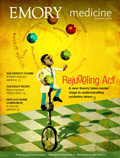The science of problem solving

"Sometimes groups make good decisions,
but groups often behave worse than any
of its members would." —Emory
psychiatrist Gregory Berns
Gregory Berns knows how to use his brain.
The Emory psychiatrist is the idea man behind the new Center for Neuropolicy, which focuses on how the brain influences decision-making in politics, policy, and business. The center involves School of Medicine, Emory College, and Goizueta Business School researchers.
“We all live in groups,” says Berns. “Sometimes groups make good decisions, but groups often behave worse than any of its members would. We’re approaching the problem of collective decision-making from a new perspective by studying how the human brain functions in groups.”
Center members will help advise decision-makers of all kinds by conducting experiments focused on biologically based pressures that influence collective decision-making. Through their discoveries, researchers will better understand how culture, intelligence, and environment influence the way decisions are made and how basic human tendencies drive judgment in certain situations.
As Berns points out, people also need to understand how religious and political ideologies become transformed in the brain and can subvert basic self-survival value judgments, a phenomenon that occurs in war and terrorism.
“Collective decision-making is political, but politics are biological,” says Berns. “The human brain evolved to function in social groups. By discovering how our brains are wired to behave in groups, we can find solutions to problems of global impact.”


